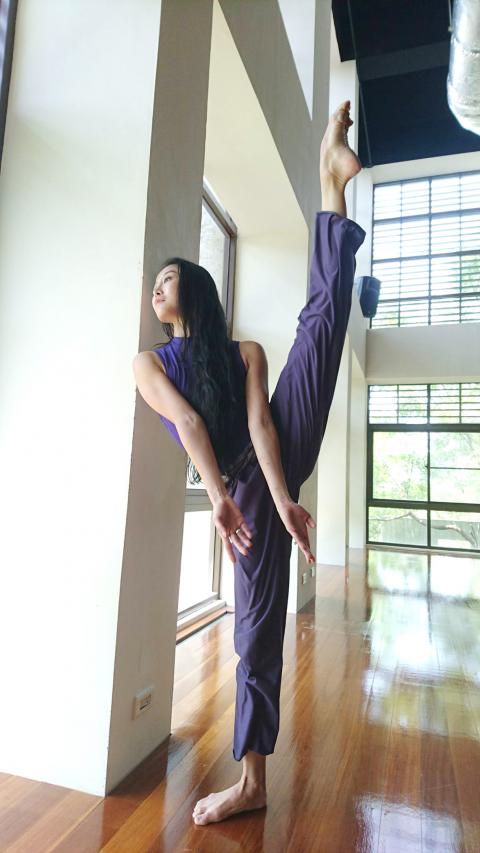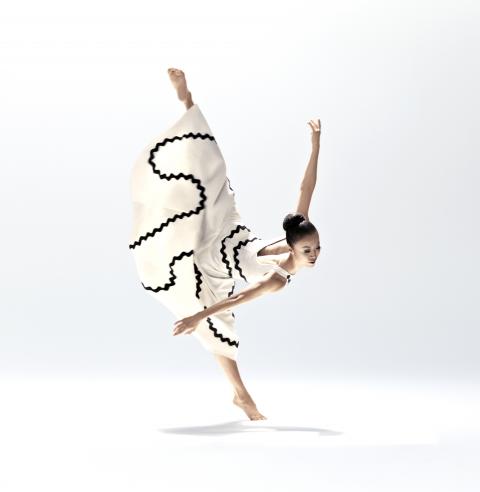The eyes of the nation will be on the Taipei Municipal Stadium tonight as the opening ceremony of the 2017 Taipei Summer Universiade gets under way at 6pm, including friends and family of the hundreds of Taiwanese dancers, university students and high-school students who will be performing.
Given one of the themes of the local and international advertising that Taipei has been running for the Games is “Taipei in Motion,” it should come as no surprise that dancers were given a key role in the welcoming event. If there is one thing that dancers know even more about than athletes, it is motion.
Wang Yun-yu (王雲幼), dean of Taipei National University of the Arts (TNUA) School of Dance, was asked to be the chief production director for the Games.

Photo courtesy of Zhang Xiao-xiong
Asked how long it took to pull the show together, Wang laughed and said the process began in January last year, when the storyline was finalized and she could start to invite choreographers, schools and dancers.
Three directors were chosen for the three cultural program segments of the ceremony: Anarchy Dance Theatre founder Jeff Hsieh (謝杰樺), theater director Liao Ruo-han (廖若涵) and visual artist Lin Kun-ying (林昆穎).
Wang said she wanted young, mid-career professionals as choreographers and designers because she wanted to promote youth, and she also wanted to highlight the nation’s wealth of professional dancers, as well as its dance students.

Photo courtesy of Hibbard Nash
About 100 modern dancers and more than 900 dance students are taking part in the ceremony, Wang said.
National Taiwan University of Sport, the National Taiwan College of Performing Arts, TNUA, Hwa Kang Arts School, the Aboriginal divisions and dance divisions at five municipal senior-high schools and four junior-high schools in New Taipei City and Taipei are contributing performers.
Many of the choreographers have their own companies, which meant they had to set aside their own work to help — such as Horse cofounder Su Wei-chia (蘇威嘉); Formosa Aboriginal Song and Dance Troupe director Fangas Nayaw; and Benson Tsai (蔡博丞) of B.DANCE.
Others are freelancers, such as Tung I-fen (董怡芬) and Shen Yi-wen.
Wang also wanted to get Taiwanese expatriates involved, so she recruited Martha Graham Dance Company principal dancer Chien Pei-ju (簡珮如) and Billy Chang Yi-chun (張逸軍), a former soloist with Cirque du Soleil, to perform, and Lin Li-chuan (林立川), who danced with the Atlanta Ballet and other companies, to choreograph.
Some of the choreographers started going to the schools in February to work with the students, but the real training began in April, Wang said.
In the past two weeks everything moved into high gear, with rehearsals at TNUA, the small stadium next to the Taipei Municipal Stadium and at buildings at Taipei International Airport (Songshan airport).
The entire cast and production had their first full dress rehearsal on Tuesday night and a second one on Thursday night.
The performers feel they are “performing for the entire nation, to show that Taiwan is not so small a place,” Wang said.
For Chien, the invitation from Wang to join the cast was a welcome chance to come home to perform.
“I didn’t think much about it, just said yes,” she said in a telephone interview yesterday. “It was a dream come true. Living in New York for 10 years, I have wanted to come back to perform and had been planning to come for the last three years, but things didn’t work out before.”
She arrived back in Taipei about two-and-a-half weeks ago and immediately began rehearsals.
“It’s been crazy this week, running back and forth between the studios at TNUA in the morning and the stadium in the evening,” she said. “It is exciting, but at the same time tense because everyone is trying to do their best.”
An added difficulty for Chien is that she will actually be dancing on LED panels, or “dancing on a big TV,” as she put it.
“As a dancer on stage, I always have to take care of my movements, my emotions, my acting, but now I have to worry about how I look on the TV,” she said. “But it’s very cool.”
The cultural segments of the performance aim to highlight Taiwan’s past, present and future under the themes nature, city and technology.
The first, titled “Vibrant Island,” will highlight Taiwan’s Aboriginal and local culture, and features a performance by Puyuma singer Sangpuy Katatepan Mavaliyw.
The second, “Hybrid Taipei,” aims to convey the sights, sounds and tastes of the city, and will feature performances by Chang, rock band Boxing (拳) and Amis pop singer A-Lin (Huang Li-ling, 黃麗玲).
The third segment, “Global Tribe,” highlights Taiwan’s digital connections with the world and features Chien’s solo, violinist Tseng Yu-chien (曾宇謙) and Taiwanese-American singer and actor Wang Leehom (王力宏).
Wang’s portion of the finale will be interactive for those inside the stadium, who will be able to participate by downloading an app that will turn their phones into instruments.
While tickets to the opening ceremony are sold out, it will be broadcast live on TV and the Internet and shown on six big screens set up in the Taipei City Hall plaza.

Alain Robert, known as the "French Spider-Man," praised Alex Honnold as exceptionally well-prepared after the US climber completed a free solo ascent of Taipei 101 yesterday. Robert said Honnold's ascent of the 508m-tall skyscraper in just more than one-and-a-half hours without using safety ropes or equipment was a remarkable achievement. "This is my life," he said in an interview conducted in French, adding that he liked the feeling of being "on the edge of danger." The 63-year-old Frenchman climbed Taipei 101 using ropes in December 2004, taking about four hours to reach the top. On a one-to-10 scale of difficulty, Robert said Taipei 101

Nipah virus infection is to be officially listed as a category 5 notifiable infectious disease in Taiwan in March, while clinical treatment guidelines are being formulated, the Centers for Disease Control (CDC) said yesterday. With Nipah infections being reported in other countries and considering its relatively high fatality rate, the centers on Jan. 16 announced that it would be listed as a notifiable infectious disease to bolster the nation’s systematic early warning system and increase public awareness, the CDC said. Bangladesh reported four fatal cases last year in separate districts, with three linked to raw date palm sap consumption, CDC Epidemic Intelligence

Two Taiwanese prosecutors were questioned by Chinese security personnel at their hotel during a trip to China’s Henan Province this month, the Mainland Affairs Council (MAC) said yesterday. The officers had personal information on the prosecutors, including “when they were assigned to their posts, their work locations and job titles,” MAC Deputy Minister and spokesman Liang Wen-chieh (梁文傑) said. On top of asking about their agencies and positions, the officers also questioned the prosecutors about the Cross-Strait Joint Crime-Fighting and Judicial Mutual Assistance Agreement, a pact that serves as the framework for Taiwan-China cooperation on combating crime and providing judicial assistance, Liang

US climber Alex Honnold left Taiwan this morning a day after completing a free-solo ascent of Taipei 101, a feat that drew cheers from onlookers and gained widespread international attention. Honnold yesterday scaled the 101-story skyscraper without a rope or safety harness. The climb — the highest urban free-solo ascent ever attempted — took just more than 90 minutes and was streamed live on Netflix. It was covered by major international news outlets including CNN, the New York Times, the Guardian and the Wall Street Journal. As Honnold prepared to leave Taiwan today, he attracted a crowd when he and his wife, Sanni,